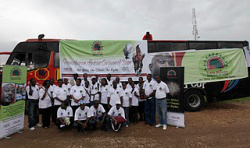CAFOD partners set off on 4,000-mile climate change convoy across Africa

The Burundi team
Hundreds of campaigners, farmers and pastoralists from all over Africa are joining a Caravan of Hope covering more than 4,000 miles and 10 countries en route to the UN climate talks in Durban, South Africa.
The coach convoy called the Trans African Caravan of Hope set off from the Burundian capital, Bujumbura on 9 November and is picking up people all along the journey's 17-day route, passing through Burundi, Rwanda, Uganda, Kenya, Tanzania, Zambia, Zimbabwe, Malawi, Botswana and South Africa.
Some of those travelling on the Caravan come from communities affected by the drought crisis in East Africa and are taking their stories of the impacts of climate change to African and other world leaders at the climate talks. Three CAFOD partners from Kenya are joining the caravan.
Mark Diba, Programme Officer for the Catholic Diocese of Marsabit in northern Kenya and CAFOD partner, said: "The current drought in East Africa has created a lot of awareness amongst pastoral communities on the impact of climate change on their everyday lives. Communities have witnessed the rainfall patterns being disrupted and this has had an impact on their ability to sustain themselves. Marsabit used to have a lot of consistent rainfall which enabled people to farm and to keep livestock.
"Now, we have had no rains for three consecutive years and even the shallow wells have dried up and communities have lost nearly all their livestock. This Caravan is an opportunity for these communities to tell their side of the story to the world on the impact climate change has had on their lives.''
CAFOD partner Kevin Kinusu, a member of the steering committee of the Kenya Climate Change Working Group (KCCWG), said: "We work with small-scale farmers assisting them to cope with the cyclical drought. Our participation in this caravan is to tell our story of how we support farmers with skills and training in how to market their produce. Africa depends mainly on agriculture to feed its people and we feel we need to tell the world how important it is to focus attention on the needs of these farmers who are the ones who feed nations. This is the story we will share with those we will meet in the 10 African countries we will pass."
The Caravan has been organised by the Pan-African Climate Justice Alliance, a CAFOD partner organisation. Those travelling to Durban are demanding the UN talks help produce a just solution to the mounting climate crisis.
Pan African Climate Justice Alliance (PACJA)'s Mithika Mwenda said: "This Caravan is very important to us as we want to tell the African story on climate change and to voice our concerns and aspirations on the impact of climate change on African communities. Africa is part of the global community and we would like to show we are responsible in discussing solutions to the problems of climate change. Africa has been doing a lot to address these issues and we feel the industrialised countries are not doing enough and therefore we want to travel to Durban to add our voice at the conference.''
The Objectives of the Caravan of Hope are:
* To mobilise and rally together African civil society articulate advocacy demands to Africa leaders to push the people's agenda on climate change and climate justice within the United Nations Framework Climate Change Convention (UNFCCC) - Conference of Parties (COP)17 that is taking place in Africa.
* To create awareness and build momentum towards UNFCCC- COP17 among African people and the rest of the world - to educate about the impact of climate change and to highlight people's testimonies and stories about how climate change is affecting Africans now.
* To lobby and pressurise African leaders/policy makers to work together in support of an international climate change treaty that is responsive to the continent's realities and reality to science.
* To drum up support for pro-people and just responses to climate change.
* To promote the African People's Petition and the demands to Heads of State and other policy-makers as evidence of the urgent action that their people require them to take at domestic level and within the African and global processes.


















